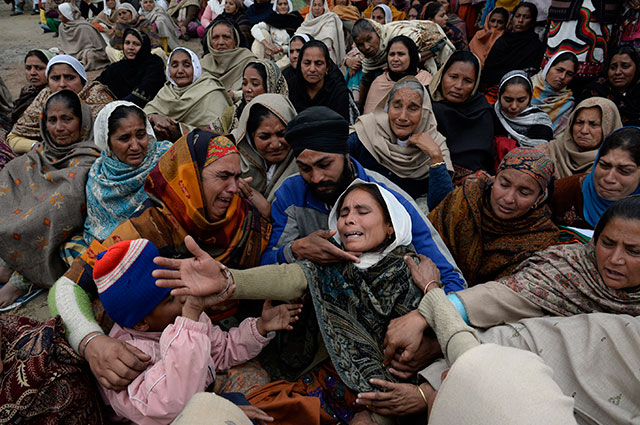
The dastardly terrorist attack on July 27th in the border district of Gurdaspur (Punjab, India) – which took the lives of 4 policemen, 3 civilians, and 3 militants – has evoked predictable responses. Indian Home Minister Rajnath Singh condemned Pakistan for the attack and warned of strong retaliation if necessary. The opposition Congress has criticized Prime Minister Narendra Modi for lacking a cohesive Pakistan policy and has called for tough measures, including postponing talks with Pakistan. Hardline religious groups like the Vishwa Hindu Parishad (VHP) have also criticized the PM’s approach towards Pakistan, urging him to adopt a harder line. VHP chief Praveen Togadia urged the PM to put an end to “sarees, shawls and mangos” diplomacy.
So far, the Modi government has not given signs of totally snapping ties with Pakistan. Sources predict that the National Security Advisor-level dialogue is likely to still take place and be followed by meetings between chiefs of border forces and then heads of military operations, in accordance with the recent joint statement at Ufa.
The question that arises is what policy should India adopt towards Pakistan following the attack? Should it totally end engagement? Should political engagement carry on as usual? Or is there a need for a more nuanced approach?
The first and most important thing India should do is maintain diplomatic channels with Pakistan and have a more calculated reaction to the terrorist attacks. So far the most common outcome has been calls to suspend engagement for a few months or a year, which includes not just political engagement but even sporting exchanges like cricketing events – there have been calls for cancelling the cricket series. The decision of the Modi government to not snap ties with Pakistan is appropriate. Suspending ties only benefits hardliners. In fact, many are of the view that the recent attack was a reaction to India and Pakistan’s joint statement at Ufa and had the blessings of sections of the army and ISI.
Ultimately, both countries have to engage – even if just for the sake of optics. It is better that they do not suspend engagement, but avoid setting ambitious goals or having unrealistic expectations. Apart from the government, other Indian stakeholders in the bilateral relationship such as members of civil society, academics, and sections of the business community should engage with their Pakistani counterparts. It is also time for the saner elements in Pakistan begin to assert themselves. Rather than promoting absurd conspiracy theories, there should be an acknowledgement of terrorism aimed at India, and realization of the fact that a repeat of such incidents will only make it tougher for saner minds on both sides.
India, for its part, needs to understand the political dynamics within Pakistan better. India consistently provides hackneyed explanations for every terrorist attack on its soil. Either it is argued that Pakistan Prime Minister Nawaz Sharif is in total control, or he is a puppet of the army who has no say. Then off course, there are those who hark back to Sharif’s entry into politics, and the role of the military, and his proximity to hardliners. While it is true, that Sharif a complicated background, today he is a mature politician who is no longer a puppet of the army as he was in his initial days, nor will he take on the army like he did in his earlier tenure.
Before engaging with Pakistan, foreign policy experts in New Delhi need to have a genuine understanding of the ground situation, and also realize that there is always an element of risk in engaging with Pakistan, and therefore they should also not expect quick fix results. As is the case in any other country, there are individuals in India with pre-conceived notions and skewed views, largely influenced by their own biases, who manage to influence the government’s Pakistan policy either directly or through their views presented on television debates or articulated in newspapers.
It is time that India realizes that engagement with Pakistan is not a favor to the latter, but a necessary course of action to achieve stability in the region. India must also realize that engagement is not just for looking good, or a way to burnish a government’s diplomatic credentials. Even bilateral meetings on sidelines need to be better thought out, and not carried out in a haphazard way without any planning.
Finally, extreme reactions –either unwarranted bonhomie or unnecessary hostility – will not resolve any issues. Vacillating between extremes has been a major problem in India’s dealings with Pakistan.
In conclusion, India needs to have a clear strategy for dealing with Pakistan. A bilateral relationship cannot simply move from one event to another, and cannot depend upon photo-ops and exchanges of gifts, how so ever sweet the mangoes may be! It needs to be based on a clear vision and meaningful diplomatic engagement.
***
Image: Shammi Mehra-AFP, Getty


